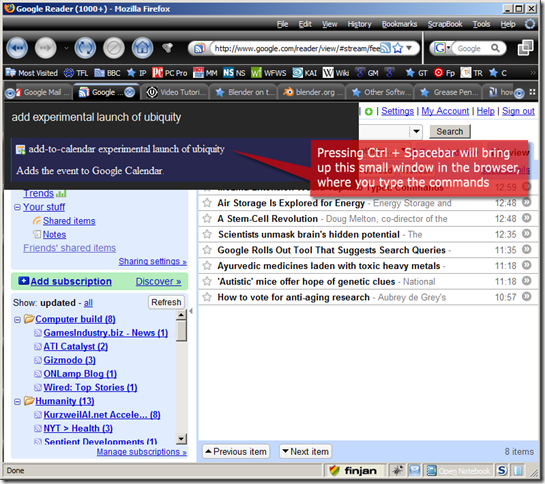Every now and then, something comes along that after first viewing and using sends a tingle along the full length of your spine. Something that has the potential to change the way we've done and used things, and makes you think where have you been all my life!
Welcome ubiquity!
After a quick download, install into FF3 and restart, the first few commands worked instantly. No falling over. No errors. It dramatically cut down on the number of clicks, tab openings and browser swapping that one needs to do.
You can see how powerful this small extension will be, once it's combined with a voice application such as dragon naturally speaking or, once computers can accurately monitor them, hand gestures.
For an alpha release, it is - at first use - very impressive. Ubiquity is one to watch. If you're not a fan of alpha releases, grab it once it's in beta.
Once downloaded it's a simple case of firing up the ubiquity interface, by pressing Ctrl + Space Bar. You can then use one of the commands that follows below; with the promise, over time, of many more commands becoming available. So subscribe to a feed or an email list, and be kept up to date with availability.
Ubiquity's like yahoo pipes, but with an added UI layer and way less complex to get decent use out of. So use as is, or if you enjoy tinkering and trying out, delve as deeply into it as you wish.
List of ubiquity commands:
| add-to-calendar | Adds an event to your calendar. Currently, only works with Google Calendar, so you'll need a Google account to use it. Try issuing "add lunch with dan tomorrow". |
| amazon-search | Searches Amazon for books matching your words. |
| answers-search | Searches Answers.com for the given words. |
| ask-search | Searches Ask.com for the given words. |
| bold | If you're in a rich-text-edit area, makes the selected text bold. |
| bugzilla | Searches Bugzilla for Mozilla bugs matching the given words. |
| calculate | Calculates the value of a mathematical expression. Try it out: issue "calc 22/7 - 1". |
| check-calendar | Checks what events are on your calendar for a given date. Currently, only works with Google Calendar, so you'll need a Google account to use it. Try issuing "check thursday". |
| close-related-tabs | Closes all open tabs that have the given word in common. |
| close-tab | Closes the tab that matches the given name. |
| command-editor | Takes you to the Ubiquity command editor page. |
| command-list | Takes you to the page you're on right now. |
| convert | Converts a selection to a PDF, to rich text, or to html. |
| define | Gives the meaning of a word. Try issuing "define aglet" |
| delete | Deletes the selected chunk of HTML from the page. |
| digg | If not yet submitted, submits the page to Digg. Otherwise, it takes you to the story's Digg page. by Sandro Della Giustina - licensed as MPL,GPL View more information at http://www.gialloporpora.netsons.org. |
| ebay-search | Searches EBay for auctions matching the given words. |
| edit-page | Puts the web page into a mode where you can edit the contents. In edit mode, you can edit the page like any document: Select text, delete it, add to it, copy and paste it. Issue 'bold', 'italic', or 'underline' commands to add formatting. Issue the 'save' command to save your changes so they persist even when you reload the page. Issue 'stop-editing-page' when you're done to go back to the normal page viewing mode. |
| | Begins composing an email to a person from your contact list. Currently only works with Google Mail, so you'll need a GMail account to use it. Try selecting part of a web page (including links, images, etc) and then issuing "email this". You can also specify the recipient of the email using the word "to" and the name of someone from your contact list. For example, try issuing "email hello to jono" (assuming you have a friend named "jono"). |
| escape-html-entities | Replaces html entities (<, >, and &) with their escape sequences. |
| flickr | Searches Flickr for pictures matching your words. |
| get-email-address | Looks up the email address of a person from your contacts list given their name. |
| | Searches Google for your words. |
| help | Takes you to the Ubiquity main help page. |
| highlight | Highlights your current selection, like this. |
| imdb | Searches the Internet Movie Database for your words. |
| italic | If you're in a rich-text-edit area, makes the selected text italic. |
| last-email | Displays your most recent incoming email. Requires a Google Mail account. |
| link-to-wikipedia | Turns a selected phrase into a link to the matching Wikipedia article. Can only be used in a rich text-editing field. |
| map | Turns an address or location name into a Google Map. Try issuing "map kalamazoo". You can click on the map in the preview pane to get a larger, interactive map that you can zoom and pan around. You can then click the "insert map in page" (if you're in an editable text area) to insert the map. So you can, for example, type an address in an email, select it, issue "map", click on the preview, and then insert the map. |
| map-these | Maps multiple selected addresses or links onto a single Google Map. (Experimental!) |
| msn-search | Searches MSN for the given words. |
| redo | Redoes your latest style/formatting or page-editing changes. |
| remove-annotations | Resets any annotation changes you've made to this page. |
| save | Saves edits you've made to this page in an annotation. |
| stop-editing-page | If you used the 'edit page' command to put the page into editable mode, use this command to end that mode and go back to normal page viewing. |
| syntax-highlight | Treats your selection as program source code, guesses its language, and colors it based on syntax. |
| tab | Switches to the tab that matches the given name. |
| tag | Adds a tag to describe the current page by Dietrich Ayala - licensed as MPL/GPL/LGPL View more information at http://autonome.wordpress.com/. |
| tinyurl | Replaces the selected URL with a TinyUrl |
| translate | Translates from one language to another. You can specify the language to translate to, and the language to translate from. For example, try issuing "translate mother from english to chinese". If you leave out the the languages, Ubiquity will try to guess what you want. It works on selected text in any web page, but there's a limit to how much it can translate at once (a couple of paragraphs.) |
| | Sets your Twitter status to a message of at most 160 characters. You'll need a Twitter account, obviously. If you're not already logged in you'll be asked to log in. |
| undelete | Restores the HTML deleted by the delete command. |
| underline | If you're in a rich-text-edit area, underlines the selected text. |
| undo | Undoes your latest style/formatting or page-editing changes. |
| view-source | Shows you the source-code of the web page you're looking at. |
| weather | Checks the weather for a given location. Try issuing "weather chicago". It works with zip-codes, too. |
| wikipedia | Searches Wikipedia for your words. by Blair McBride - licensed as MPL. View more information at http://theunfocused.net/moz/ubiquity/verbs/. |
| word-count | Displays the number of words in a selection. |
| yahoo-search | Searches Yahoo for pages matching your words. |
| yelp | Searches Yelp for restaurants matching your words. You can search for restaurants near a certain location using the near modifier. For example, try "yelp pizza near boston". |
| youtube | Searches YouTube for videos matching your words. |
| zoom | Zooms the Firefox window in or out. |
One thing, it is javascript based. As it pulls many elements together, it brings added layers of usability and freedom, but (until it's fully tied down) you will need to keep an eye on potential security issues, if using commands from non-trusted sites.


No comments:
Post a Comment